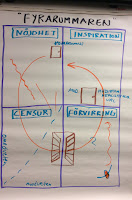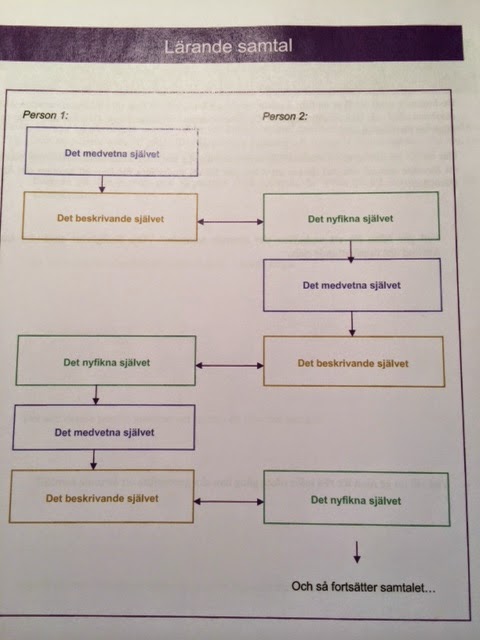The Gold Mine Effect - 10000 hours
I got help to enter the door to the "Talarforum breakfast seminar" by a hotel employee at Savoy hotel in Malmö. I was 5 minutes late to Rasmus Ankersen talking about "The Gold Mine Effect" due to "eagerness to act child supportive" in the morning (last minute home-work check, helping out with caviar on my daughters sandwich...) and mis-judgement of the weather and traffic situation (removing ice from the front window of my car before being able to drive away, slow traffic on the highway due to a temperature some degrees below zero)... Sitting down I found myself in the middle of the Simon Kjaer story (see video clip further down below)... Rasmus, a former football player that did not make it to the top himself, continued to tell us that he some years ago got obsessed to figure out what it is that creates high performers? Is it talent or is it hard work? (Picture from Keith Bird agency)
To figure out how some of the best athleetes in the world do it, he quite his job and went for a 6 month Gold mine expedition, checking out middle distance runners in Bekoji, Ethiopia; female golf players in Seuol, Korea; football players in Rio, Brazil; sprint runners in Kingston, Jamaica; female tennis players in Moscow, Russia, and 3000 meter steeplechase runners in Iten, Kenya. His observations were that Talent is a tipping point (meaning that you need a minimum level of talent, e.g. long enough to play basket) but it is hard work that makes the difference.
He referred to studies performed by Anders Ericsson (The making of an expert) which clarifies that you need 10 000 hours of practice to become a high performer - to master your area of expertise. If you consider that boys in Brazil play footbool many hours a day from a very early age, young people in Ethiopia and Kenya run every day to school (maybe 10 km one way) - it is not that strange that some of them have the ability to continue with hard work to achieve mastery. A 13-year old boy in Brazil has already done his 10 000 hours of training.
So, how to identify talents? Rasmus showed two criteria that are the most important to focus on:
1. Always look beyond the result
Many people look for performance at an early stage in a persons development, instead of looking for potential. Those are two different things. Studies say that among early teens playing football or icehockey, the ones that are percieved to be the best are the ones born in January-March. Why? Because they are often more physically developed than their peers, they seem to have more talent. Instead of looking for performance, you really should look for potential taking away the interference.
2. Put hunger over skills.
This is all about motivation. Winners are often found by people that have had to fight for their desires starting at an early age. Carol Dweck has done some studies (see clip below) that clearly shows that praising young people for "trying out hard" is much better than praising them for "being smart". This implies that you actually should look for those people that are willing to try out new difficult things and also are willing to fail, instead of looking for those that always succeed doing the same thing every time.
Rasmus told us a quote from James Cameron:
Personal reflections: This quote has a straight link to the famous business leadership concept and book by Pekka Viljakainen - "No Fear". Regarding how to identify leaders och high performers in business context, I think the above is aligned with my Leadership formula (Hedins ledarskapsformel) that says that leadership result is of course depending on a decent level of knowledge and skills in the area you work (also measured by IQ and EQ), but mostly on the motivation and energy (the drive) that you put into your work.
So, please have a look into parts of the breakfast seminar that was found via YouTube: "A winner is a loser who evaluated himself", by Rasmus Ankersen:
And remember, whereever you are:
Finally, something for all of us that have children. How to communicate and praise good efforts..., Carol Dweck via YouTube:
To figure out how some of the best athleetes in the world do it, he quite his job and went for a 6 month Gold mine expedition, checking out middle distance runners in Bekoji, Ethiopia; female golf players in Seuol, Korea; football players in Rio, Brazil; sprint runners in Kingston, Jamaica; female tennis players in Moscow, Russia, and 3000 meter steeplechase runners in Iten, Kenya. His observations were that Talent is a tipping point (meaning that you need a minimum level of talent, e.g. long enough to play basket) but it is hard work that makes the difference.
He referred to studies performed by Anders Ericsson (The making of an expert) which clarifies that you need 10 000 hours of practice to become a high performer - to master your area of expertise. If you consider that boys in Brazil play footbool many hours a day from a very early age, young people in Ethiopia and Kenya run every day to school (maybe 10 km one way) - it is not that strange that some of them have the ability to continue with hard work to achieve mastery. A 13-year old boy in Brazil has already done his 10 000 hours of training.
So, how to identify talents? Rasmus showed two criteria that are the most important to focus on:
1. Always look beyond the result
Many people look for performance at an early stage in a persons development, instead of looking for potential. Those are two different things. Studies say that among early teens playing football or icehockey, the ones that are percieved to be the best are the ones born in January-March. Why? Because they are often more physically developed than their peers, they seem to have more talent. Instead of looking for performance, you really should look for potential taking away the interference.
2. Put hunger over skills.
This is all about motivation. Winners are often found by people that have had to fight for their desires starting at an early age. Carol Dweck has done some studies (see clip below) that clearly shows that praising young people for "trying out hard" is much better than praising them for "being smart". This implies that you actually should look for those people that are willing to try out new difficult things and also are willing to fail, instead of looking for those that always succeed doing the same thing every time.
Rasmus told us a quote from James Cameron:
- Failure is an option, but fear is not!
Personal reflections: This quote has a straight link to the famous business leadership concept and book by Pekka Viljakainen - "No Fear". Regarding how to identify leaders och high performers in business context, I think the above is aligned with my Leadership formula (Hedins ledarskapsformel) that says that leadership result is of course depending on a decent level of knowledge and skills in the area you work (also measured by IQ and EQ), but mostly on the motivation and energy (the drive) that you put into your work.
So, please have a look into parts of the breakfast seminar that was found via YouTube: "A winner is a loser who evaluated himself", by Rasmus Ankersen:
And remember, whereever you are:
- You have your own Simon Kjaer problem!
Finally, something for all of us that have children. How to communicate and praise good efforts..., Carol Dweck via YouTube:




Kommentarer
Skicka en kommentar